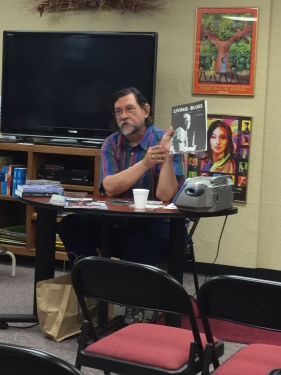
by Kelly Rogge, KCKCC
The melodic sounds of the blues drifted through the Kansas City Kansas Community College Intercultural Center April 30 as students and staff listened to blues historian Jim O’Neal.
O’Neal is the research director of the Mississippi Blues Trail and is co-founder of Living Blues magazine, the first magazine in the United States dedicated to covering the blues. He is considered an expert in American blues history and served as co-editor of “The Voice of the Blues: Classic Interviews from Living Blues Magazine.” He was inducted into the Blues Hall of Fame in 2002. In addition, he launched BluEsoterica Archives and Productions in 1998.
“Most of the music that I liked was blues-based. They were covering American blues by people like Muddy Waters, Jimmy Reed and Howlin’ Wolf. I traced the music back from the Rolling Stones and people like that to the people who originated the music,” he said. “We need to promote and document this tradition and honor where the music came from. It really opened a whole new world for me.”
During his visit to KCKCC, O’Neal discussed how he became interested in the musical genre and touched on a few legendary blues musicians including Casey Bill Weldon, a mysterious jazz guitarist who has ties to the Kansas City area. Weldon is best known for playing a Hawaiian steel guitar, which was unique in the 1920s and 1930s as well as for being one of the first musicians at the time to play an electric instrument.
O’Neal then discussed his role with the Mississippi Blues Trail. Created by the Mississippi Blues Commission in 2006, it works to place markers at some of the most notable historical sites related to blues throughout the state of Mississippi.
“The Mississippi Blues Trail is something that has developed in recent years,” he said. “It is a series of historical markers that the state of Mississippi decided to fund, which was kind of amazing in itself. The reason Mississippi has so much blues is because the people had the blues from living in Mississippi. That was a painful episode of Mississippi history and American history, but out of it came this beautiful music.”
O’Neal said he believes it is the common themes that are woven through blues music that has led to its endurance.
“It was a release to make you feel better,” he said. “Yes it was specific to African American culture at the time, but I think one of the reasons why it was so widely accepted around the world was that there were a lot of universal themes.”
For more information on the Mississippi Blues Trail, visit msbluestrail.org.
Kelly Rogge is the public information supervisor at Kansas City Kansas Community College.
